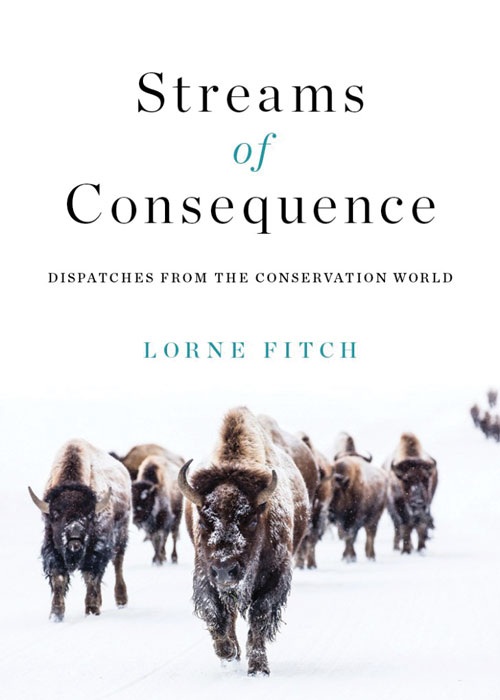How do we know who we are if we don’t look in the mirror called the landscape?” Lorne Fitch asks us at the outset of his debut book, Streams of Consequence. A collection of essays from the perspective of a biologist who has dedicated 50 years of his life to studying, monitoring and advocating for wildlife in Alberta, the book is an allegorically written, philosophical cry to pay attention to the wild spaces and species that have suffered over the last century due to unbridled resource extraction in Alberta.
A scientist by training and profession, Fitch is also a gifted storyteller. Returning to his childhood on the prairies, he recalls the way his brother used to feast on a chocolate bar before breaking what was left in half to share it—a reflection on the false rhetoric of “balance” between resource development and the environment. “In government planning, I have noticed a tendency to ignore everything that happened prior to the plan and allocate resources based on what’s left,” he writes. “Institutional amnesia magically erases the existing development footprint.”
Fitch asks us to draw our attention to what the Alberta government has ignored, including the “tiny, cryptic and overlooked” prairie species. In Chapter 2, his poetic prose draws readers into the fascinating ecologies of beavers, kissing frogs and short-horned lizards—a reptile species that miraculously survives winter by burrowing in loose soil on south-facing slopes. Short-horned lizards, threatened by well-sites and pipelines, which “can appear almost overnight,” writes Fitch, were designated as endangered in 2006. The following year, 16,000 acres of lizard habitat was protected by the government, forcing industry activity elsewhere. While it’s a good news story for lizards, Fitch points out the stark reality facing many lesser-known threatened species in Alberta, which fall into the “gray netherworld of an imperilled species, where a recovery strategy takes years to plan and longer to implement.”
In chapters 4 and 5 Fitch pays homage to Alberta’s threatened fish—“our cousins”—and rivers through poetic observations that move beyond scientific or biological understandings to relational ones. He refers to trout with the same reverence found in a Neruda poem, describing “the patterns on the back and sides of trout, the blushes of colour” as “maps of a world at its beginning.” That trout are now at risk, having survived on the landscape for thousands of years, should convey something alarming to us, writes Fitch. “Once lost” they cannot be restored, “even with the wealth of a thousand mines.”
Fitch worked as a biologist both inside and outside of the system and he’s long grown tired of empty rhetoric when it comes to land and wildlife management. “Mitigation,” he writes, “may be the most potent public relations rhetoric yet to rationalize the loss of a river, a forest or a piece of prairie.”
Streams of Consequence is a biologist’s lament to listen and act in accordance with the needs of wild landscapes and species in Alberta. “A river sings to us and, sometimes, about us,” writes Fitch. A river can roar with “ferocity,” yet its silence is also “a worrying signal, a sign that we need to act—and stop ignoring.”
In the face of unchecked resource development, Fitch also offers readers examples of local solutions, documenting stories of everyday Alberta ranchers who’ve adapted their agricultural practices to steward habitat for wild species on the prairies. Streams of Consequence is a timely read given the ecologically devastating threats facing people, environment and wildlife in Alberta’s eastern slopes by expanding coal mining development. It’s a reminder of the imperative to move beyond the futility of hope without action to meaningfully advocate for the wild places that sustain us. “Remember, the future isn’t a place that we’re going to,” he writes. “It’s a place that we get to create.”
Trina Moyles is the author of Lookout (Vintage, 2022).
_______________________________________


